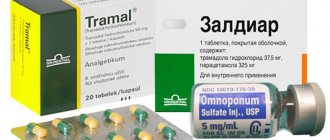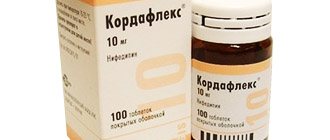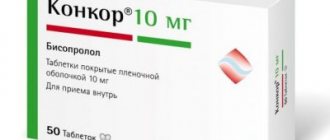Pharmacological properties of the drug Arifon retard
Indapamide ((RS)-4-chloro-3-(sulfamoyl)-N-(2,3-dihydro-1H-indol-1-yl)-benzamide) is a diuretic, antihypertensive agent. The chemical structure is a sulfonamide derivative with an indole ring. Its pharmacological properties are similar to thiazide diuretics. Due to the complex mechanism of action, Arifon has a pronounced hypotensive effect and does not cause a significant diuretic effect. The action is carried out at the level of the kidneys and blood vessels. At the kidney level, indapamide increases the excretion of sodium and chlorine ions in the urine, and to a lesser extent, the excretion of potassium and magnesium, contributing to a slight increase in diuresis. The effect of indapamide on the vascular wall is due to its high lipophilicity. Indapamide changes the transmembrane flow of ions (mainly calcium), reduces the sensitivity of the vascular wall to adrenaline and stimulates the synthesis of substances with vasodilatory activity - prostaglandin E2 and prostacyclin I2. This leads to dilation of arterioles, a decrease in peripheral vascular resistance and blood pressure. Arifon reduces left ventricular hypertrophy; does not affect lipid metabolism (TG, LDL cholesterol, HDL cholesterol) and carbohydrate metabolism, including in patients with hypertension (arterial hypertension) and diabetes mellitus, reduces the severity of microalbuminuria. The antihypertensive effect of the drug persists in patients on hemodialysis. The use of an innovative dosage form based on a hydrophilic matrix ensures uniform release of indapamide and effective blood pressure control for 24 hours, and also allows reducing the content of indapamide per tablet to 1.5 mg and thus reducing the risk of hypokalemia by 62%. When prescribed at a dose of more than 1.5 mg, the antihypertensive effect of the drug does not increase, while the likelihood of side effects increases. Indapamide is quickly and completely absorbed from the digestive tract. The maximum concentration in the blood serum after a single dose is reached after approximately 1–2 hours. The equilibrium state is achieved after 7 days from the start of treatment. 79% of indapamide binds to plasma proteins. The half-life averages 18 hours (14–24 hours). About 70% of indapamide is excreted in the urine, 22% in feces. The pharmacokinetics of the drug does not change in patients with renal failure. In patients with hepatic impairment, the use of thiazide or thiazide-like diuretics may cause the development of hepatic encephalopathy.
Pharmacodynamics and pharmacokinetics
The active component is indapamide . The drug has a vasodilating effect .
In terms of its pharmacological mechanism of action, Arifon is similar to thiazide diuretics: the process of reabsorption of sodium ions in the cortical region in the loop of Henle is disrupted.
The drug enhances the excretion of chlorine and sodium ions in the urine, as well as magnesium and potassium. The drug selectively blocks “slow” calcium channels, reduces peripheral vascular resistance, and increases the elasticity of arterial walls. Arifon does not affect the metabolism of carbohydrates, the content of lipids in the blood, and helps to reduce the size of the hypertrophied left ventricle.
The medication reduces the sensitivity of vessel walls to the effects of norepinephrine , angiotensin-2, stimulates the production of prostacyclin, prostaglandins , and reduces the production of stable, free oxygen radicals .
Prescription of high dosages does not affect the level of reduction in blood pressure in proportion to diuresis. With regular use, a stable result is observed in the second week of therapy.
Side effects of the drug Arifon retard
Considering the fact that most of the side effects of indapamide are dose-dependent, reducing the content of the active substance in the Arifona retard tablet to 1.5 mg made it possible to significantly reduce the likelihood of developing side effects. Hypokalemia may develop (especially in patients at risk); hyponatremia, accompanied by hypovolemia and dehydration with the possible development of orthostatic hypotension. Concomitant loss of chloride ions may secondary cause compensatory metabolic alkalosis. Hyperuricemia and hyperglycemia are possible; hypercalcemia is very rare. Hematological disorders develop extremely rarely: leukopenia, thrombocytopenia, agranulocytosis, hemolytic or aplastic anemia. From the digestive tract, nausea, constipation, dry mouth are observed, in isolated cases - pancreatitis, in patients with liver failure - hepatic encephalopathy. From the central nervous system - dizziness, asthenia, paresthesia, headache. Hypersensitivity reactions are possible in patients prone to them (maculopapular rash, purpura, exacerbation of systemic lupus erythematosus).
Side effects
The severity of side effects is dose-dependent.
Digestive tract: epigastric pain, diarrhea , constipation , dyspeptic disorders, nausea, dry mouth, gastralgia , vomiting, appetite disturbances.
Nervous system: nervousness, dizziness, headaches, asthenia, vertigo , drowsiness, asthenia, fatigue, agitation, irritability, muscle spasms, nervousness , malaise, lethargy, lethargy, depression, sleep disturbances.
Sense organs: conjunctivitis , visual disturbances.
Respiratory system: sinusitis, cough, pharyngitis, rhinitis.
Cardiovascular system: hypokalemia reflected in the ECG, orthostatic hypotension, palpitations, arrhythmia.
Urinary system: polyuria, nocturia .
It is also possible to develop an allergic response, chest pain, flu-like syndrome, back pain, infectious lesions, hyperglycemia, hyperuricemia, hypercalcemia, increased plasma urea nitrogen, hypercreatininemia , hypochloremia, vasculitis, rash, itching, urticaria .
Special instructions for the use of the drug Arifon retard
Before starting treatment and during the period of use of the drug, the level of potassium, sodium, calcium and glucose in the blood plasma should be monitored, kidney function should be monitored (creatinine and urea levels in the blood plasma) and ECG monitoring, especially in cases of water-electrolyte balance disorders and gout , diabetes mellitus, liver or kidney failure, in elderly patients. Hypokalemia (less than 3.4 mmol/l) is a predisposing factor in the development of dangerous arrhythmias and increases the toxicity of cardiac glycosides. Such patients should more often monitor the level of potassium in the blood serum and correct it, especially in patients at risk (elderly people, with an unbalanced diet, in patients with liver cirrhosis, coronary artery diseases, heart failure, with a prolongation of the QT by ECG). The possible development of hyperuricemia contributes to the occurrence of gout attacks. The use of the drug in athletes may cause a positive reaction during doping control. The drug is not recommended for use in children. Arifon retard does not interfere with psychomotor reactions and can affect the ability to drive vehicles and operate dangerous machinery only in the event of a sharp decrease in blood pressure. It is not recommended to prescribe the drug during pregnancy and breastfeeding.
Contraindications
The medication is contraindicated in case of severe pathology of the renal system, with anuria , encephalopathy, hypokalemia, intolerance to Indapamide , with diabetes mellitus with ketoacidosis (decompensated form), with acute disruption of the blood supply to the brain, with galactosemia , lactose intolerance.
For pathologies of water-electrolyte metabolism , hyponatremia, CHF, coronary artery disease, ascites, moderate renal failure, breastfeeding, hyperparathyroidism , gout , elderly people, and pregnant women Arifon is prescribed with caution.
Interactions of the drug Arifon retard
The simultaneous administration of the following drugs with Arifon retard is not recommended: lithium salts (an increase in the concentration of lithium in the blood serum with the development of toxic manifestations; if it is necessary to prescribe such a combination, the level of lithium in the blood serum should be monitored), astemizole, bepridil, erythromycin, halofantrine, pentamidine, sultopride , terfenadine, vincamine (increased risk of developing ventricular flutter-fibrillation, especially in the presence of hypokalemia, bradycardia or prolongation of the QT ). The following drugs should be prescribed with caution along with Arifon retard: NSAIDs for systemic use, including salicylates in high doses (possible development of acute renal failure in patients with dehydration; it is necessary to monitor kidney function and rehydrate), drugs that reduce the level of potassium in the blood - amphotericin B with intravenous administration, gluco- and mineralocorticoids for oral administration, tetracosactide, laxatives that stimulate peristalsis (increase the risk of hypokalemia), corticosteroids, tetracosactide (reduced antihypertensive effect as a result of water and sodium retention in the body), cardiac glycosides ( hypokalemia increases the risk of developing toxic effects of digitalis), potassium-sparing diuretics - amiloride, triamterene, spironolactone (possible development of hyperkalemia in patients with renal failure), ACE inhibitors (possible development of sudden arterial hypotension or renal failure due to hyponatremia in patients with dehydration; it is recommended to stop using the diuretic 3 days before prescribing ACE inhibitors, then, if necessary, the diuretic is resumed), antiarrhythmic drugs - quinidine, hydroquinidine, disopyramide, bretylium tosylate, sotalol and amiodarone (the risk of developing paroxysms of flutter-ventricular fibrillation increases, especially in the presence of hypokalemia or prolongation of the QT interval), metformin (risk of developing lactic acidosis due to the development of renal failure), iodine-containing contrast agents (with dehydration caused by the use of diuretics, the risk of developing acute renal failure increases; fluid and electrolyte balance should be restored before contrast administration), tricyclic antidepressants ( potentiate the hypotensive effect and increase the risk of developing orthostatic hypotension), calcium salts (risk of developing hypercalcemia), cyclosporine (increased serum creatinine levels), estrogens (due to fluid retention in the body, the hypotensive effect of the drug may be reduced).
Arifon, instructions for use (Method and dosage)
According to the instructions for use, Arifon is recommended to be taken in the morning. The initial dose of indapamide for arterial hypertension is 1.25-2.5 mg per day.
Arifon retard is prescribed in the morning at a dose of 1.5 mg.
If therapy is ineffective within a month, medications with a different principle of action are added to the treatment.
It is not recommended to increase the dosage of the drug due to the risk of increasing the severity of side effects.
Overdose of the drug Arifon retard, symptoms and treatment
Symptoms of overdose (taking very large doses) are primarily manifestations of water and electrolyte disturbances (hyponatremia, hypokalemia). Clinically, nausea, vomiting, hypotension, convulsions, drowsiness, dizziness, polyuria or oliguria up to anuria (which is a consequence of hypovolemia) may occur. First aid measures include rapid elimination of the drug by gastric lavage and/or administration of activated carbon, followed by restoration of water and electrolyte balance in a hospital setting.
Interaction
Arifon slows down the excretion of lithium from the body in the urine, which leads to its accumulation and nephrotoxic effects.
When using iodine-containing contrast agents in high dosages, the risk of developing pathology of the renal system increases. Before administering iodine-containing contrast medications, lost fluid must be restored.
The use of the drug Arifon may reduce the effectiveness of indirect anticoagulants , indandione derivatives, and coumarin derivatives.
The drug can enhance the severity of the blockade of neuromuscular transmission that occurs when taking non-depolarizing muscle relaxants.
Glucocorticosteroids , thiazide and loop saluretics, tetracosactide, laxatives, amphotericin B can cause hypokalemia.
Digitalis intoxication is recorded with simultaneous administration of cardiac glycosides.
Intravenous administration of erythromycin, astemizole, vincamine, trefenadine, sultopride, pentamidine, disopyramide, quinidine, sotalol, amiodarone, bretylium tosylate causes arrhythmias of the feast type due to the synergistic effect.
Tetracosactide, glucocorticosteroids, and adrenergic stimulants reduce the severity of the hypotensive effect of the drug; the opposite effect is recorded when baclofen .
Acute renal failure and arterial hypotension develop with additional intake of ACE inhibitors.
Antipsychotic medications, tricyclic, imipramine antidepressants increase the likelihood of developing orthostatic hypotension and increase the severity of the hypotensive effect.
Hypercreatininemia is diagnosed with the use of cyclosporine.
Arifona price, where to buy
The price of Arifon in 2.5 mg tablets is 410 rubles per pack of 30 pieces.
- Online pharmacies in RussiaRussia
- Online pharmacies in UkraineUkraine
- Online pharmacies in KazakhstanKazakhstan
ZdravCity
- Arifon tablets p.p.o.
2.5 mg 30 pcs. Servier 181 rub. order - Arifon retard tab. with counter.release.p.p.o. 1.5 mg 30 pcs OOO Servier Rus
RUB 203 order
Pharmacy Dialogue
- Arifon tablets 2.5 mg No. 30Servier
190 rub. order
- Arifon retard (tablet with control high.p/pl./vol. 1.5 mg No. 30) Servier Rus LLC
RUB 201 order
- Arifon retard tablets 1.5 mg No. 30Servier/Serdix
RUB 194 order
show more
Pharmacy24
- Arifon retard 1.5 mg No. 30 tablets Lab.Serve Industries, France/Serve Industries Ltd., Ireland/Anfarm Sub.Pharmac.
AT, Poland 99 UAH. order
PaniPharmacy
- Arifon retard tablets Arifon retard tablets. 1.5 mg No. 30 France, Servier Industrie
110 UAH order
show more
Arifon's analogues
Level 4 ATC code matches:
Chlorthalidone
Klopamide
Ravel SR
Indapamide
Indap
Analogues include the following drugs: Vasopamide , Indap , Indapamide , Indapen , Indapres , Indiur , Ipamid , Lorvas , Ravel , Softensif , Hemopamide .
Which is better Indapamide or Arifon?
Both drugs contain the same active ingredient indapamide . It is believed that Arifon works more efficiently and creates fewer side effects, however, it is more expensive.
It should be remembered that both drugs have the same effect, being generic drugs.
Arifon and Arifon Retard
The Retard form is a controlled-release tablet and contains 1.5 mg of active substance per tablet instead of 2.5 mg.
The Retard form involves reducing the occurrence of side effects.


